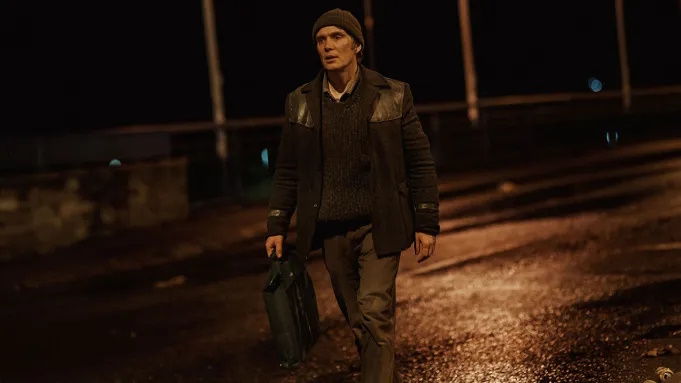Whether it’s last year’s Oscar champ ‘The Banshees of Inisherin,’ the Apple TV+ hit ‘Bad Sisters’ or this year’s Berlinale opener ‘Small Things Like These,’ the Emerald Isle continues to lure producers thanks to experienced crews, generous tax incentives, and a wealth of versatile locations: “There’s still so much of Ireland that hasn’t been on screen yet.”

BY BECKY LUCAS Plus Icon
“You can literally film anything in Ireland that you want to — obviously desert scenes are a bit complicated, but we’ll have a go.” In this quick quip, veteran Irish producer Tristan Orpen Lynch sums up so much about his home country’s movie business right now. A fresh swell of opportunity and confidence may be swirling through it, thanks to the government’s decision to allow producers to claim back 32 percent of any spend on film, TV and animation to $134 million, up from $75 million. However, insiders say it’s actually in the midst of a deeper sea change built upon decades of investment, support and training — always combined with the nation’s innate charm and visually striking locales.
In 2021, the Irish screen industry rapidly bounced back after COVID to generate €500 million ($547m) local spend, its highest ever and 40 percent more than the last record set in 2019. Roll on 2023, and more Irish talent — including Colin Farrell, Martin McDonagh, Kerry Condon, Barry Keoghan, and Paul Mescal — and locally shot productions like The Irish Goodbye, first-ever Irish-language International Oscar nominee, An Cailín Ciúin (The Quiet Girl) and The Banshees of Inisherin were up for more Academy Awards than any ceremony ever before: 14 in total. This has been followed by only two fewer nominations in 2024, with Cillian Murphy landing a best actor Oscar and the surprise four-gong success of Irish studio Element Pictures’ co-production Poor Things, also shot by nominated Dubliner Robbie Ryan. Elsewhere, Irish/Northern Irish co-production Kneecap became the first ever Irish-language film at the Sundance Film Festival, and Cillian Murphy’s Small Things Like These was the first Irish film to open the Berlinale.
This sort of success doesn’t come out of nowhere. “It all goes back to when the Irish Film Board was reestablished [renamed Screen Ireland in 2018] by [now] President Michael D. Higgins, in the 90s,” says Orpen Lynch, a former board director who started his career in 1989. “He prioritized film. And despite certain setbacks, like massive recession [and] the pandemic, the government has stayed very strongly committed to it.” When it wavered, he adds, the creatives united to put it back on course. “We had a Finance Minister called Charlie McCreevy who threatened to take away our tax credit [in 2003]. The whole industry came together — I think even Bono got involved,” he recalls. “It was like the whole country rose up to protect it.”
Now Screen Ireland continues to demonstrate its faith, with a 2024 budget of $42 million, another record. In January, it launched a production slate of 40 projects spanning feature films, TV dramas, animation and documentaries plus 30 shorts, while 38 percent of the productions it funded in 2023 were led by local emerging directors or screenwriters. “That’s a big focus for us: ensuring there are pathways through, from skills development in the industry to bringing in new entrants through our network of talent academies across the country,” says Screen Ireland CEO Désirée Finnegan. “Half of our productions in this year’s slate were from debut film directors, too.”
As well as funding, Screen Ireland has guaranteed continuous growth via the terms of its tax incentive, which, since 2019, has required projects to provide skills development for both new and experienced local professionals. “Ireland’s expanding pool of highly trained and internationally experienced crew, in particular key heads of departments, is of the highest world standard,” says David McLoughlin, producer at Metropolitan Films International, whose 2023 co-productions include season two of The Tourist starring Jamie Dornan, and Anniversary with Kyle Chandler, fully set in Washington, D.C. but entirely shot in Ireland.
Indeed, the versatility of the island’s landscapes continues to enthrall even local filmmakers and directors. “I’m from the West Coast and I go around a bend and think ‘Oh my God, that’s an amazing location’,” says Bad Sisters director Dearbhla Walsh. “There’s still so much of Ireland that hasn’t been on screen yet. When you see how True Detective: Night Country used Iceland for Alaska, it’s amazing to think how we could double-up so many parts of Ireland; even the Midlands which still have a kind of a romance.”
Then there’s the climate. “Suddenly when you’re grading in your telephony studio, you realize rain and gray can be interesting to look at and reflect characterization; everything isn’t California sunshine.”
Walsh even notes a rise in Irish accents in film, in parallel with Ireland’s rise as a shooting hub. “There are definitely more and more Irish accents,” she says. “Take Andrew Scott’s character in All of Us Strangers. They dealt with [why he has an accent] in the script, which I think worked incredibly well. People aren’t making excuses now. And my experience on Bad Sisters with the casting revealed that there is an extraordinary amount of fresh talent from Northern Ireland, which must be linked to Game of Thrones [filming there]. Now when the accent pops up in an international story, it has really positive connotations, whereas maybe it hasn’t before.”
So what else might lure a producer to Ireland, besides the tax breaks, quality crew, wealth of homegrown talent and variable terrain? “I’m not going to be twee about it, but there’s something culturally unique about getting business done in Ireland and that experience you have,” says Elaine Geraghty, managing director of Ardmore Studios, the country’s oldest, in County Wicklow, and Troy Studios, its newest and largest, in Limerick. “And it does come with being an island nation. It’s a tight community — everybody in the screen industry knows each other. That’s really helpful when you’re trying to get business in and make sure people have the best experience.”
Homegrown producer Rob Walpole, most recently behind Sundance 2023 and Apple+ success Flora and Son, agrees there is a special energy about the scene right now. “For a small country, we have always punched way above our weight in terms of literature, with our playwrights, novelists, poets. But it never felt that we fully converted that to the medium of film and televisual storytelling,” he says. “It’s really only in the last 20 years that we’ve been able to develop the kind of infrastructure to support today’s level of activity. That brings with it a certain level of drive, freshness and enthusiasm. As a Director of Production coming here, you’ll find there’s a real energy, from the very top down to people who are just beginning their careers.”
It’s a dynamism that suggests the latest investments will lead to equally exciting accomplishments. In December 2023, Screen Ireland introduced the Animation Innovation and Immersive Development Fund, “designed to support animators exploring new formats and technologies,” says Finnegan, as well as “provide space for filmmakers to take risks and explore new ways of working.” It has also developed a pilot prototype fund for game development, supported by the government’s Digital Games Tax Credit. Meanwhile, a €300 million ($327 million) studio, Greystones Media Campus, is set to open this year, and Ardmore Studios is constructing three new sound stages. Right now, Ireland is also supporting Ireland House at the SXSW film fest, currently underway in Austin, Texas, where on Tuesday, March 12 fest attendees had the opportunity to take in two talks: “Ireland Unveiled: Shaping the World Through Storytelling,” and In “Conversation with the Kneecap Filmmakers.”
“I think [what’s made] the difference [in Ireland] is: the government sees the industrial value of it now,” says Walpole. “We used to argue that investing in film production would draw people to visit and that we should have the means to tell our own stories to ourselves. And that’s still all true. But beyond that, now there’s this huge amount of employment that is something that the government will not want to lose. It’s really about how we creatively move forward from here and optimize what has been an extraordinary run.”
Dublin City Film Office
Civic Offices • Wood Quay, Dublin 8, D08 RF3F, Ireland
Phone: (+353) 01 222 2222 • Monday – Friday, 9:00 am – 5:00 pm

